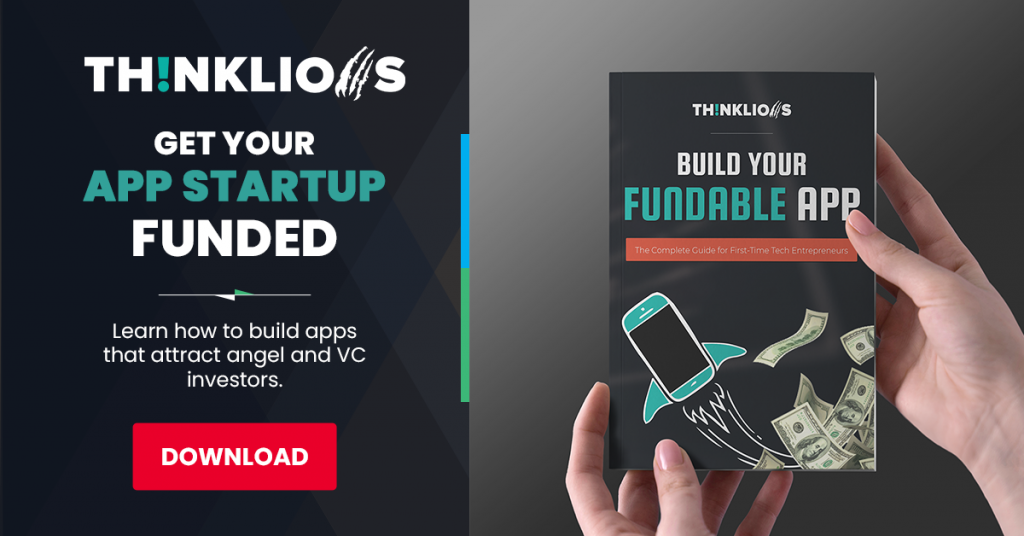There’s one thing that’s common among all successful apps, it’s that they have the ability to secure investment and create wealth for their founders and stakeholders. However, not many app developers and tech startups make it to the top, and unfortunately, not all of them are making millions from apps. There’s a major difference between apps that made a few thousand dollars before fizzling away and apps that made millions. Some apps only offer a momentary solution to a problem, but the apps that really take off are those that provide their consumer with a continuous solution that draws them back over and over again.
In the past, the apps that made millions were mostly those that served an extremely mass audience – serving millions of people with low per customer value; and producing extreme profits as a result. Tinder, for example, is a multi-billion dollar company that serves an extremely wide market (singles of any type), while there are also several niche-focused Tinder clones (like Bristler – the dating app for those in love with facial hair) that are successful in their own right; but will likely never meet the mass scale of Tinder.
Tech startups like Tinder were made for mass scale adoption, and from it’s initial introduction, it wasn’t much of a surprise that it quickly went viral. However, some apps that made millions did so unexpectedly – maybe they were made for a specific or niche market but caught on with the masses, or maybe started off serving one type of consumer but was able to expand to other customer segments.

It’s hard to believe that Facebook wasn’t originally made to be the social media conglomerate that it is today. In the earliest stages, it was simply just a site that showed the faces of Harvard students and allowed other students to rate them. Was it luck? Not really. More so, it was the ability to recognize an opportunity and capitalize on it that made Facebook take off.
Not every idea will turn into an app worth a million dollars; every startup won’t raise investor funding; and very few will be the next Facebook – but what does it take to build software that makes the most money? To grasp what is necessary for success, it’s a good idea to look at the journeys of apps that made millions (and raised millions), and especially, those who originally didn’t seem as if they were multi-million dollar ideas. In this article, we’re going to examine 7 of our favorites, and give you the insights you need to launch the next million dollar startup!
1. Slack
Today, Slack is king when it comes to team communication solutions. Founded by Stewart Butterfield, Slack is a cloud-based set of collaboration tools and services that allows teams to streamline their communication and collaborate more effectively. Slack is now used by millions of teams around the world – but it didn’t really start that way.
Initially, Slack was developed as a side project to help the team at Tiny Speck manage their cross-team communications during the development of the game Glitch (now defunct). While their main project no longer exists, the tool they built for their internal team ended up being exactly what other internal teams needed too.
Originally founded in 2009, Slack has raised over $790 million in investor funding over 10 funding rounds. While many other tech startups exist in the collaboration and productivity sector, Slack is most notable due to it’s ease of use, flexibility, ability to integrate with other apps, and its effectiveness across teams both small and large. Slack will soon move from our apps that made millions list to our apps that made billions list – they are projecting revenue of $1 billion within the next year!
Insights: Slack’s minimal viable product was their internal software, which they found to be extremely effective for team collaboration. If you want to create an app that makes millions, you’ll need something that’s more than “cool” – you will need to create something that truly improves the user’s experience. Look at the problems that you face in everyday life – what solutions could exist that would solve or ease those issues?
2. IFTTT
IFTTT is a website that puts the internet to work for you. The acronym stands for “If This, Then That”; and seeks to automate tasks by connecting all your internet-based services.
IFTTT launched into the automation sector at the right time. It’s first applications were built by the Company’s founding team in 2010. At this time, the Company’s founder described IFTTT as “digital duct tape if you will, allowing you to connect any two services together.” With the solution, you could take any two services and use them together to create processes that the original creators didn’t specifically intend.
By 2012, IFTTT users had already created over 1 million tasks. During this same year, the Company integrated with Belkin WeMo devices to officially enter the “Internet of Things” space which vastly expanded their capabilities.
Today, IFTTT supports over 360 different services including Facebook, Twitter, Philips Hue, Dropbox, Google, Nest, Fitbit, BMW and Slack. Each year, hundreds of new services are added to the platform. These integrations allow users to automate an infinite number of processes – such as lighting an app-controlled lamp when a Facebook notification is received. To date, the startup has received funding of approximately $62.5 million. By 2014, the Company was already valued at $210 million – with it’s valuation growing considerably each and every year. Although the app has not yet identified a business model, user activity has proven its value to investors – who are lined up to invest into the potential of the app! Even without revenue, this company is definitely one of the most clever software ideas that made people rich. When the community is big enough, even startups with no revenue can become one of the apps that made millions!
Insights: IFTTT was initially built to connect two services together, but today, users are able to connect multiple software and hardware services together to create almost unlimited numbers of tasks. Your startup might not end up being what you first thought it was going to be. The key thing is to find a problem, create a minimal solution, and then let your users tell you what they really want through their usage and behavior.
3. Segment.io
Segment.io was initially introduced to the market by three MIT roommates who dropped out of college to participate in Y Combinator’s summer 2011 program. In the beginning, the team was focused on building a competitive solution to Google Analytics or KISSmetrics. However, they found it difficult to get users to adopt their solution as opposed to their much more established competitors.
In their search for the right solution, they built up a library called Analytics.js that combined all the analytic services and APIs together. An open source version of this library was released on GitHub. Co-founder, Peter Reinhardt said, “The open source version started growing by itself, so after a couple of months, we decided to pivot and build what people seemed to actually want: a beautiful, simple analytics API.”
As of today, Segment.io has raised $108.7 million in funding over 6 financing rounds. Although Segment’s revenue is not made public, they have stated that “Today more than 15,000 companies rely on Segment to process 80 billion end-user actions a month.” Without a doubt, Segment is one of the successful million dollar mobile app ideas that are worth talking about!
Insights: Sometimes, what you think customers want isn’t really what they want. It is important to keep your ear to your market to figure out exactly what they are looking for, and identify the gaps that other competitors aren’t servicing. When your original idea isn’t working out, figure out why, and pivot!
4. Magic
In today’s world, on demand is all the rage. Whether it’s on-demand restaurant delivery or on-demand ride sharing services; consumers of today want the effortless ability to have the world at their fingertips. Magic was created to fill this void by providing a 24/7 SMS based on-demand personal assistant service; literally allowing users to do anything on demand.
Magic was founded by Aaron Kemmer, Benjamin Godlove, David Merriman, Michael Rubin, Mike Chen, and Nic Novac in 2015. Magic combines artificial intelligence and virtual assistants with real people to create an on-demand service that seems almost limitless. Here are a few query examples that the company shared on their website:
- “I left my credit card at a bar. Can you pick it up for me and bring it to my hotel?”
- “Rent me the cheapest economy car at DFW airport for Sept 11-12, starting 7pm.”
- “My anniversary is tomorrow, and I want a photographer to take pictures.”
Today, Magic has established a working app business model; charging around $35 per hour for their on-demand services. Their user base has opened up to serve corporate clients also – acting as a personal assistant for busy executives. Magic secured an initial seed funding amount of $125,000 and has since raised over $12.6 million.
Insights: Many startups are able to grow their revenues considerably by taking one solution and opening it up to other markets. Identify what target market you will serve, and also consider secondary markets that could benefit from your solution.
5. SafetyCulture
SafetyCulture is an app startup that aims to solve problems related to workplace safety and quality management. While the issue of health and safety or quality management may not sound like an exciting multi-million idea; those who manage these processes are in high demand for effective solutions. SafetyCulture uses a unique collaborative safety model, where workers can create and share new ways of working safe. SafetyCulture’s application, iAuditor, has now been used to conduct over 3 million safety inspections globally. The company also released SafetyCloud, which helps users manage data collected in the field.
SafetyCulture is an Australia-based company that was founded in 2004. In 2013 however, it is assumed that they made a huge jump in innovation and fundability – as they began raising a high level of capital; now equal to over $87.6 million.
Insights: App success doesn’t come overnight. In many cases, the original idea won’t be super successful and success comes after many pivots are made. Serving a niche market doesn’t mean your app can’t make millions, but it does mean that you need to really become the industry expert and learn what it would take to serve them in the most effective way possible.
6. Curefit
Curefit is described as an “end-to-end solution that will enable users to take full control of their health to improve the quality of life and reduce long-term healthcare costs. In India, healthcare is estimated to be a $280 billion market by 2020. In response to this, founder Mukesh Bansal created a total solution that wraps preventative healthcare up into one app. By managing their health proactively through a suite of service offerings, users can reduce the risks of long-term chronic illnesses.
So far, Curefit has raised over $55 million and is in the process of potentially securing another $75 million in their current round. The business currently has a revenue run rate of $15 million and recently acquired a stake in the
Bengaluru-based fitness startup, Cult.
Insights: If you’re going to enter a crowded space, your app needs to really stand out. There are enough dating apps, on demand apps, events apps, etc. – what really makes yours any different? Curefit was able to combine several software products into one to create an end-to-end solution, whereas competitors were only offering management of a single health-related process. Your USP should be clarified, and you should only enter the market after you have clearly defined you competitive advantage.
7. SignalFx
SignalFx is a monitoring platform for modern infrastructure that was founded in 2013. The company collects metrics across the cloud, provides powerful visualizations and offers advanced monitoring services. Their major advantage is that they are able to deliver a consolidated real-time visualization of infrastructure, services and applications.
SignalFX was developed by two founders with impressive backgrounds. The Company’s CEO, Karthik Rau’s background included positions at Delphix and VMware; while CTO, Phillip Lio, spent 4 years working at Facebook as a software architect. Liu told TechCrunch, “I worked on the infrastructure team at Facebook. I built a lot of configuration monitoring tools.”
A common theme amongst apps that made millions, is that they’ve also raised millions to progress their software. To date, the company has raised a total of $103.5 million and is continuing to invest aggressively into their research and development.
Insights: There’s nothing that ensures a successful startup journey than solid experience. The founder’s backgrounds gave them a major advantage in operating their business and raising capital. If you want to know what it takes to run an app startup, go work (or intern) for one! At minimum, partner with an app incubator, as this will give you access to mentors who know exactly what it takes – helping you avoid obstacles that can be costly in both time and money.
Do You Have A Million Dollar App Idea?
A million dollar app idea means very little without excellent execution. One common thread about successful apps is that they launched into the market, learned exactly what their consumers were demanding and pivoted their businesses wherever necessary.
Lean startup methodology is the key to building apps that make millions. The first step to building a successful app is to launch your minimal viable product and begin validating your assumptions – or identifying where pivots are necessary. If you’d like to learn more about how to make millions from apps and how to position your startup for success, contact us today for a free consultation!
What are your favorite apps that made millions? What million dollar mobile app ideas do you wish you came up with first? Tell us about it in the comments below!
















